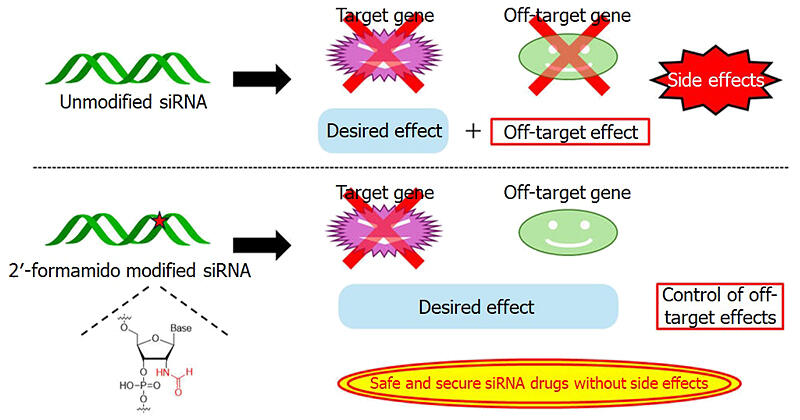Small interfering RNA (siRNA) drugs have been used for the treatment of serious hereditary diseases, such as ATTR amyloidosis and hypercholesterolemia. However, they may act on unwanted sites and cause side effects (off-target effects). To address this concern, a research group led by Professor Hiroshi Abe of the Institute for Glyco-core Research and Doctoral Student Kohei Nomura of the Graduate School of Science at Nagoya University, conducted research in collaboration with Doctoral Student Seongjin An and Associate Professor Kumiko Ui-Tei (at the time of this study, currently Project Researcher) of the Graduate School of Frontier Sciences at the University of Tokyo. The group successfully reduced off-target effects by incorporating 2′-formamido derivatives of nucleic acids as new molecular structures into siRNAs. siRNAs containing 2′-formamidonucleosides are expected to be safe and secure siRNA drugs with fewer side effects in Japan. This study was published in Nucleic Acids Research.

Provided by Nagoya University
siRNAs act on the target gene sequence. However, certain human genes share common partial sequences with target genes. Therefore, siRNAs can act on normal genes other than disease-causing genes (off-target effects). There is a call for the development of safe and secure siRNA drugs in which off-target effects that can cause side effects are decreased. These off-target effects are attributed to the binding of the target recognition site of siRNA, called the seed region, to non-target genes. Therefore, reducing the binding strength of the seed region, i.e., the stability of double-stranded RNA, is considered a promising approach to reducing off-target effects.
The RNA derivatives with a formamide modification at the 2′ position, which were developed in this study, greatly decreased the stability of double-stranded RNAs. Thus, they introduced one modified nucleoside into the seed region of siRNA. As expected, the off-target effects were successfully reduced. Activity against target genes of the modified siRNAs was equivalent to that of the unmodified siRNAs. Therefore, the introduction of 2′-formamidonucleosides into siRNAs can only reduce the off-target activity while maintaining the target activity.
The results of this study provide a strong foundation for the development of siRNA drugs with fewer side effects and are expected to increase their safety and security. Over the next two years, the research group will confirm the efficacy and safety in animal experiments and scale up synthetic processes for application to siRNA drugs.
Journal Information
Publication: Nucleic Acids Research
Title: Synthesis of 2′-formamidonucleoside phosphoramidites for suppressing the seed-based off-target effects of siRNAs
DOI: 10.1093/nar/gkae741
This article has been translated by JST with permission from The Science News Ltd. (https://sci-news.co.jp/). Unauthorized reproduction of the article and photographs is prohibited.




